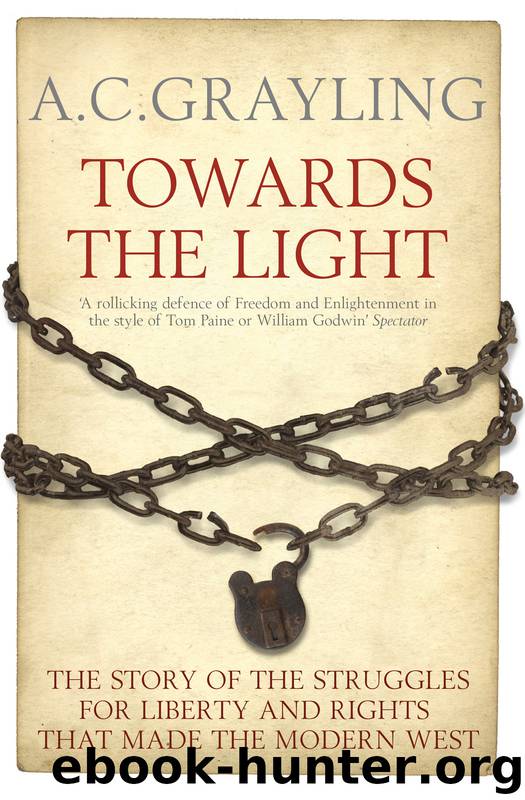Towards the Light by A. C. Grayling

Author:A. C. Grayling
Language: eng
Format: epub
Publisher: Bloomsbury Publishing
Published: 2007-03-19T04:00:00+00:00
It was both right and inevitable that campaigns against slavery should make people see slavery in other places too: in the factories of the nascent industrial revolution, and in the kitchens of domesticity; the slavery – albeit of a different kind and order but slavery nevertheless – of workers and women.
‘Slavery in Yorkshire’ was the title given by Richard Oastler to a series of letters he published in the Leeds Mercury in 1830, describing the plight of workers in the mills of the town of Bradford, and attacking William Wilberforce, the local MP, for ignoring the slavery under his nose while basking in the glory of having led the abolitionist campaign in Parliament. ‘Let truth speak out,’ Oastler wrote, ‘appalling as the statement may appear. The fact is true. Thousands of our fellow-creatures and fellow-subjects, both male and female, the inhabitants of a Yorkshire town (Yorkshire now represented in Parliament by the giant of anti-slavery principles), are at this very moment existing in a state of slavery more horrid than are the victims of that hellish system – Colonial Slavery. These innocent creatures draw out unpitied their short but miserable existence, in a place famed for its professions of religious zeal, whose inhabitants are ever foremost in professing ‘Temperance’ and ‘Reformation’, and are ever striving to outrun their neighbours in Missionary exertions, and would fain send the Bible to the farthest corners of the globe – aye in the very place where the anti-slavery fever rages most furiously, her apparent charity is not more admired on earth than her real cruelty is abhorred in heaven. The very streets which receive the droppings of an ‘Anti-Slavery Society’ are every morning wet with the tears of innocent victims at the accursed shrine of avarice, who are compelled, not by the cart-whip of the Negro slave-driver, but by the dread of the equally appalling thong or strap of the overlooker, to hasten half-dressed, but not half-fed, to those magazines of British Infantile Slavery – the Worsted Mills in the neighbourhood and town of Bradford! Thousands of little children, both male and female, but principally female, from seven to fourteen years, are daily compelled to labour from six o’clock to seven in the evening with only-Britons, blush whilst you read it! – with only thirty minutes allowed for eating and recreation.’20
The tone of outrage was justified by the fact that what Oastler described was the reality, and not just in Bradford. Throughout Britain the condition of these people was, to use Oastler’s no less than accurate term, appalling. Enclosures and new methods of agriculture in the eighteenth century had driven huge numbers of people off the land; machine production and rapid industrialisation sucked them into towns which ballooned in size – between 1801 and 1831 the population of Liverpool grew from 82,000 to 202,000, of Manchester from 95,000 to 238,000, a pattern which repeated itself everywhere in the industrial regions of the country and even more in London. Yet even as machine and steam
Download
This site does not store any files on its server. We only index and link to content provided by other sites. Please contact the content providers to delete copyright contents if any and email us, we'll remove relevant links or contents immediately.
| Anthropology | Archaeology |
| Philosophy | Politics & Government |
| Social Sciences | Sociology |
| Women's Studies |
The remains of the day by Kazuo Ishiguro(8999)
Tools of Titans by Timothy Ferriss(8395)
Giovanni's Room by James Baldwin(7346)
The Black Swan by Nassim Nicholas Taleb(7129)
Inner Engineering: A Yogi's Guide to Joy by Sadhguru(6794)
The Way of Zen by Alan W. Watts(6614)
The Power of Now: A Guide to Spiritual Enlightenment by Eckhart Tolle(5781)
Asking the Right Questions: A Guide to Critical Thinking by M. Neil Browne & Stuart M. Keeley(5775)
The Six Wives Of Henry VIII (WOMEN IN HISTORY) by Fraser Antonia(5515)
Astrophysics for People in a Hurry by Neil DeGrasse Tyson(5189)
Housekeeping by Marilynne Robinson(4447)
12 Rules for Life by Jordan B. Peterson(4304)
Ikigai by Héctor García & Francesc Miralles(4274)
Double Down (Diary of a Wimpy Kid Book 11) by Jeff Kinney(4272)
The Ethical Slut by Janet W. Hardy(4251)
Skin in the Game by Nassim Nicholas Taleb(4248)
The Art of Happiness by The Dalai Lama(4130)
Skin in the Game: Hidden Asymmetries in Daily Life by Nassim Nicholas Taleb(4006)
Walking by Henry David Thoreau(3962)
